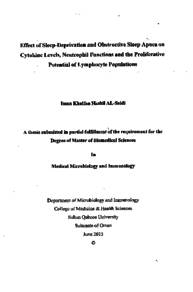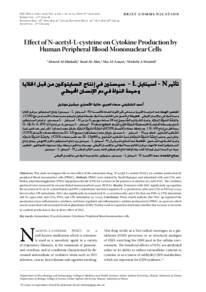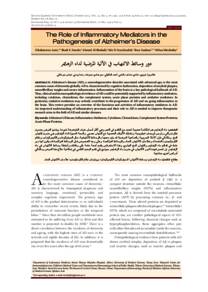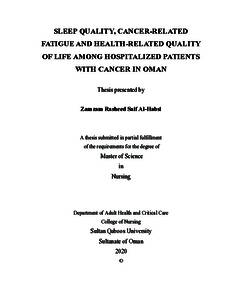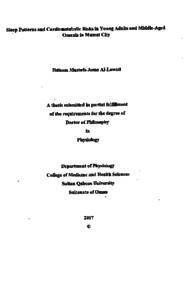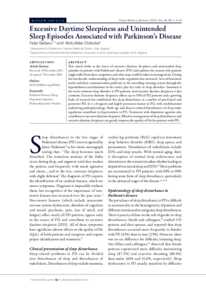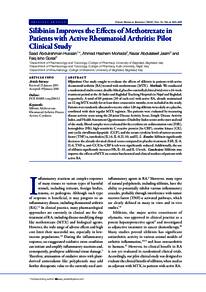وثيقة
Effect of sleep-deprivation and obstructive sleep apnea on cytokine levels, neutrophil functions and the proliferative potential of lymphocyte populations
الناشر
Sultan Qaboos University
ميلادي
2015
اللغة
الأنجليزية
الموضوع
الملخص الإنجليزي
Growing evidence suggests a bidirectional communication between the central nervous system and immune system concerning sleep. Some studies suggest the presence of a relationship between the lack of sleep and the changes in immune functions and inflammatory profile. However, knowledge about the effect of sleep deprivation on the immune system is limited and the results are contradictory. The objective of this study is to investigate the effect of sleep deprivation and obstructive sleep apnea (OSA) on: the functions of neutrophils (phagocytosis and production of reactive oxygen species (ROS), the levels of T helper (Thl) and Th2 cytokines and chemokines and the ex vivo proliferative patterns of T-cells (CD4 & CD8), natural killer (NK) cells (CD8+ & CD8-) and NKT cells. We enrolled in this study a total of 22 sever OSA patients, 21 healthy volunteers who slept 7 to 8 hrs/day for one week and 8 healthy volunteers who slept 7 to 8 hrs/day during the first week, 5 hrs/day during the second week and 7 to 8 hrs/day during the third week. Levels of the different cytokines and cortisol were measured in patient's serum using cytometric beads array (CBA) and enzyme-linked immunosorbent assay (ELISA), respectively. Neutrophils functions were measured using phagocytosis assay and nitroblue-tetrazolium (NBT) test. The proliferative capacity of T-cells, NK cells and NKT cells was analyzed using flow cytometry. Our data showed increased IL-1B levels in OSA patients. These levels significantly correlated with the increase in the percentage of CD4 T-cells in these patients (p = 0.038). In addition, there was an increase in the levels of IL-6 (p = 0.004) and CXCL 9 (p = 0.028) during sleep deprivation, while a decrease in the levels of IFN-Y (p = 0.008) in OSA patients was noted. Moreover, phagocytosis and ROS production were reduced in both OSA patients and during sleep deprivation. Interestingly, the decrease in the ROS production correlated directly with the decrease in phagocytosis in patients with OSA (p = 0.01). Finally, there was a decrease in the CD4 T-cells population during sleep deprivation (p = 0.017) and an increase in the proliferative potential of NK cells in OSA patients (p = 0.007). Our results indicate that sleep deprivation and OSA alter the immune functions. This altered pattern of the immune functions occurred independently of the presence of cortisol.
الوصف
Thesis
المجموعة
URL المصدر
الملخص العربي
أظهرت الدراسات أن الحرمان من النوم قد يهيئ لكبت المناعة. فوظيفة الجهاز المناعي هي حماية الكائن الحي من التعرض لاعتداءات مستمرة من مسببات الأمراض. والنظام المناعي هو مجمع متكامل من الخلايا والوسطاء والتي بدورها تتكامل مع النظام العصبي الصمي لتحقيق هذا الهدف. ويعتقد الآن أن هذه التفاعلات بين الجهاز العصبي والنظام المناعي هي ثنائية الاتجاه، والتحديات التي يمكن أن يتعرض لها الجهاز المناعي يمكن أن تؤثر وتغيز في نمط النوم الطبيعي. ينظر هذا البحث في تأثير المتغيرات الناتجة عن الحرمان من النوم ومرض توقف التنفس أثناء النوم (OSA) على: وظائف الخلايا الحبيبية المتعادلة البلعمة) وإنتاج أنواع الأكسجين التفاعلية ( ROS)، مستويات السيتوكينات الالتهابية الناتجة من الخلاية التائية المساعدة (ت م1 وت م2) و الكيموكينات وقابلية التكاثر الخلايا التانية (CD4و CD8) و الخلايا القاتلة الطبيعية ( CD8 + , CD8 : NK والخلايا القاتلة التائية (NKT). الإنجاز هذه الأهداف تم أخذ عينات من 22 من المرضى المصابين بتوقف التنفس أثناء النوم، و 21 من المتطوعين الأصحاء الذين قامو بالنوم لمدة 7-8 ساعة يوم لمدة أسبوع واحد، 8 متطوعين أصحاء الذين قامو بالنوم لمدة 7-8 ساعة/يوم خلال الأسبوع الأول، 5 ساعات يوم خلال الأسبوع الثاني ثم 7-8 ساعة يوم خلال الأسبوع الثالث. تم قياس مستويات السيتوكينات والكورتيزول في الدم باستخدام CBA و ELISA على التوالي، وتم قياس وظائف الخلايا الحبيبية المتعادلة باستخدام فحص البلعمة وفي الدم باستخدام اختبار NBT. و تم تحليل الخلايا اللمفاوية باستخدام التدفق الخلوي (flow Cytometry). تظهر النتائج زيادة في مستوى 18-IL المرتبط بشكل كبير مع الزيادة في نسبة الخلايا التائية (CD4) في مرض توقف التنفس أثناء النوم. بالإضافة إلى ذلك كانت هناك زيادة في مستويات 6-IL في مرض توقف التنفس أثناء النوم و زيادة في 9-CXCL خلال الحرمان من النوم. في حين لوحظ انخفاض في مستويات 7-IFN في مرض توقف التنفس أثناء النوم. علاوة على ذلك كان هناك إنخفاض في وظائف الخلايا الحبيبية المتعادلة: البلعمة وإنتاج ROS في كل من مرض توقف التنفس أثناء النوم و خلال الحرمان من النوم. ومن المثير للاهتمام، تناسب الانخفاض في إنتاج ROS مع الانخفاض في البلعمة عند مرضى توقف التنفس أثناء النوم. لوحظ انخفاض في نسبة الخلايا التائية (CD4) أثناء الحرمان من النوم وزيادة في القدرة التكاثرية للخلايا القاتلة الطبيعية (NK) في مرض توقف التنفس أثناء النوم. تشير النتائج إلى أن الحرمان من النوم ومرض توقف التنفس أثناء النوم يؤثران على وظائف جهاز المناعة. هذا التغيير حدث بشكل مستقل عن تأثير مستويات هرمون الكورتيزول الذي بقي دون تغيير.
قالب العنصر
الرسائل والأطروحات الجامعية

